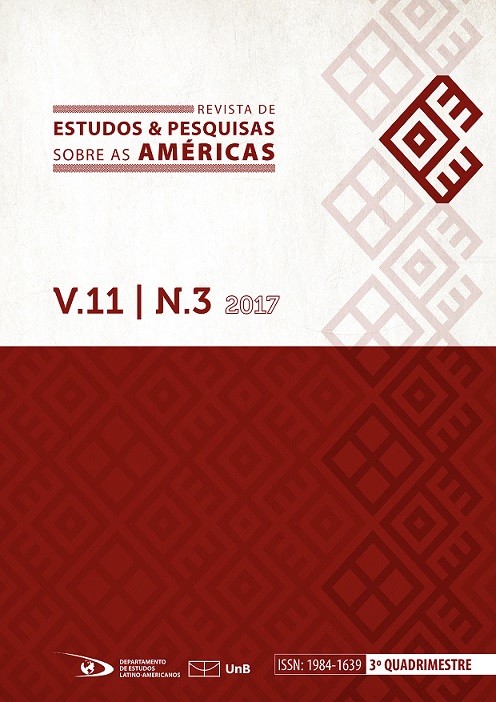Algunas Claves del Aporte de los Intelectuales Indígenas para Pensar desde América Latina
Keywords:
Ciencia PolíticaAbstract
Resumen
Se presentan aquí elementos considerados claves del aporte de los llamados intelectuales indígenas -categoría que incluye a los que, reconociéndose como indígenas y ligados a los movimientos étnicos, dan el debate en el ámbito académico, pero también a los líderes y comunicadores que aportan elementos a este debate y al político- a la problemática epistémico-política en América Latina. Para esto se utilizan materiales bibliográficos y de trabajo de campo. El trabajo se estructura en cinco secciones fundamentales: la problemática de la intelectualidad indígena; la politización de lo étnico; la espacio-temporalidad; el dilema Buen Vivir / Desarrollo y el Nuevo Constitucionalismo y los principios indígenas. Se concluye con una valorización de este aporte en la búsqueda de un pensamiento original y autónomo para las Ciencias Sociales y para la praxis política en nuestra región.
Palabras clave: intelectuales indígenas - politización de lo étnico ”“ Buen Vivir ”“ Nuevo Constitucionalismo
Algumas Chaves da Contribuição dos Intelectuais Indígenas para Pensar desde América Latina.
Resumo
Apresentam-se aqui elementos considerados chaves do aporte dos chamados intelectuais indígenas -categoria que inclui os que, reconhecendo-se como indígenas e ligados aos movimentos étnicos, realizam o debate no âmbito acadêmico, mas também à s lideranças e comunicadores que contribuem com elementos para este e para o debate político- à problemática epistêmico-política em América Latina. Para isto utilizam-se materiais bibliográficos e de trabalho de campo. O trabalho estrutura-se em cinco secções fundamentais: a problemática da intelectualidade indígena; a politização do étnico; a espaço-temporalidade; o dilema Bom Viver / Desenvolvimento e o Novo Constitucionalismo e os princípios indígenas. Conclui-se com uma valorização deste aporte na busca de um pensamento original e autônomo para as Ciências Sociais e para a práxis política na nossa região.
Palavras chave: intelectuais indígenas ”“ politização do étnico ”“ Bom Viver ”“ Novo Constitucionalismo
Some Keys to the Contribution of the Indigenous Intellectuals to Think from Latin America
Abstract
Here are presented key elements of the contribution of the
indigenous intellectuals - a category that includes those who recognize themselves as indigenous and are connected to ethnic movements and hold the debate in the academic arena and leaders and communicators who contribute to this debate and also to the political one - to the epistemic-political problematics in Latin America. For this, bibliographical materials and fieldwork are used. The work is structured in five fundamental sections: the problematics of the indigenous intellectuality; the politization of the ethnic; the space-temporallity; the dilemma of Good versus Development and the New Constitutionalism and the indigenous principles. This paper concludes with an appreciation of this contribution in the search for an original and autonomous thought to the Social Sciences and to the political praxis in our region.
Key-words: indigenous intellectuals ”“ politization of the ethnic ”“ Good Living ou Buen Vivir ”“ New Constitucionalism
Downloads
Downloads
Published
How to Cite
Issue
Section
License
The published material is the property of the Journal, and may be reproduced in whole or in part with indication of the source.
Copyright: Authors will be responsible for obtaining the copyright of the material used. Authors who publish in this journal agree to the following terms:
a)Authors retain the copyright and grant the journal the right of first publication, with the work simultaneously licensed under
the Creative Commons Attribution License which allows the sharing of work with acknowledgment of authorship and initial publication in this journal.
b) Authors are authorized to take additional contracts separately, for non-exclusive distribution of the version of the work published in this journal (eg, publish in institutional repository or as a book chapter), with acknowledgment of authorship and initial publication in this journal.
c) Authors are allowed and encouraged to publish and distribute their work online (eg in institutional repositories or on their personal page) at any point before or during the editorial process, as this can generate productive changes as well as increase the impact and the citation of the published work (See The Effect of Free Access).
















